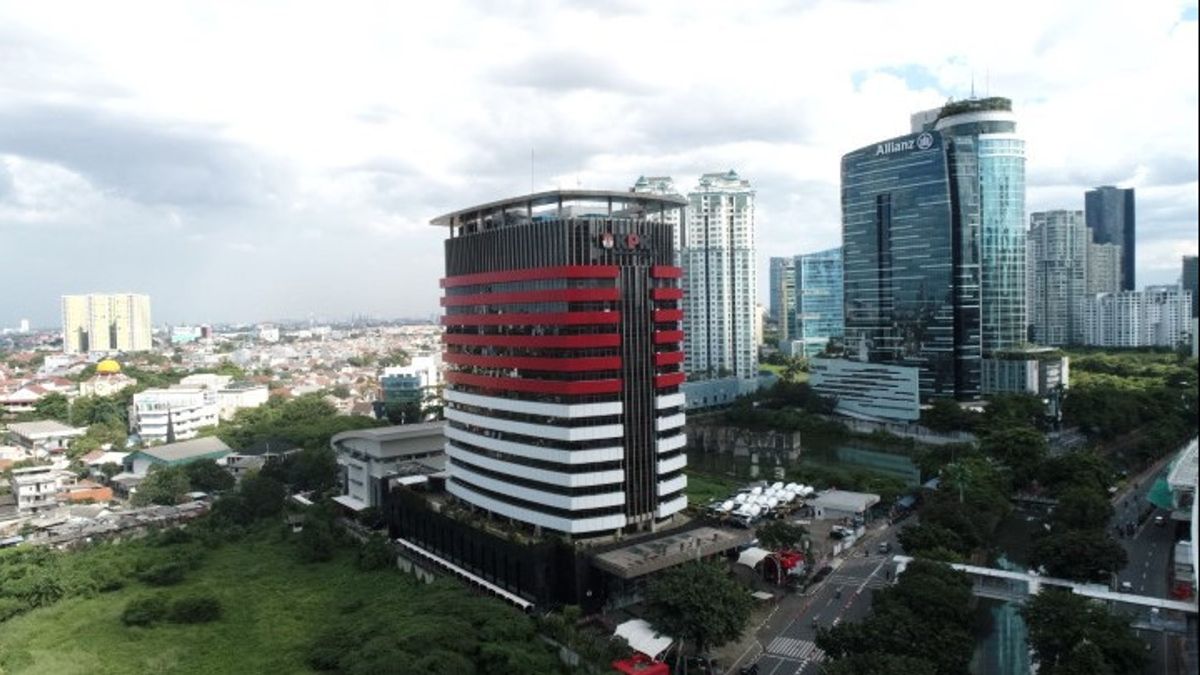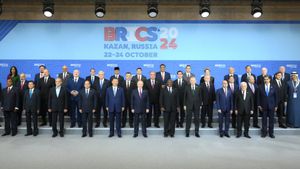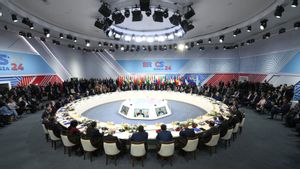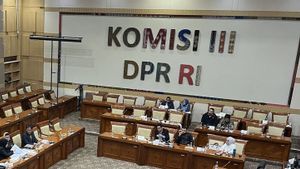JAKARTA - Since being led by Firli Bahuri, the Corruption Eradication Commission (KPK) has often prioritized the prevention of racist practices. However, this program is considered ineffective by the Financial Audit Board (BPK).
In the report on the Summary of Examination Results for Semester II of 2020, the BPK stated that the implementation of corruption prevention carried out by the KPK under the leadership of Firli Bahuri was ineffective because there were a number of problems.
"The results of the examination conclude that the effectiveness of the management of the corruption prevention function and the management of confiscated objects and confiscated goods from corruption cases has not been fully effective," said the report, which was downloaded from the BPK's official website, Monday, July 12.
There are a number of problems that hinder its effectiveness, one of which is the amendment to the KPK regulations that do not fully support the tasks and functions of coordinating the prevention and management of confiscated and confiscated goods.
The regulation in question is the KPK Regulation (Perkom) Number 7 of 2020 concerning Organization and Work Procedures (Ortaka) which has not been supported by adequate studies, analysis and alignment.
In addition, there are also duties and functions that are not regulated in these regulations. Among them are the authorities and work units implementing the KPK prevention coordination task, the duties and functions of the Directorate of Asset Tracking, Evidence and Execution Management (Labuksi), implementing the information system application development function and data from the Labuksi Directorate, as well as job descriptions or job descriptions related to the management of confiscated money deposits. and gratuities.
"As a result, efforts to strengthen the function of preventing and managing confiscated objects and confiscated goods have the potential to not be carried out effectively, as well as the potential for not implementing the legal umbrella that can be the basis for carrying out activities," the report said.
Another problem, said BPK, relates to efforts to prevent corruption through the coordination and monitoring functions of the Monitoring Center for Prevention (MCP) activities that have not been implemented adequately. Support for facilities and infrastructure for the implementation of the coordination and monitoring functions of corruption prevention is also considered to be still not optimal.
Furthermore, BPK also said that the process of compiling indicators and sub-indicators as well as weighting the value of the area of corruption prevention intervention in local government governance was inadequate. The reason is that the involvement of ministries, institutions, and local governments as stakeholders is still not maximized
Next, this agency assesses that the implementation of guidelines for monitoring activities for preventing corruption in local government governance has not been fully consistent.
This then resulted in MCP activities by the Prevention Coordination and Supervision Work Unit (Korsupgah) which were not optimal in supporting corruption prevention efforts.
In the report, BPK also reported other problems in the implementation of the enforcement and execution functions that did not yet support the management of confiscated objects, confiscated items, and confiscated execution items.
This problem, said BPK, was found among other things at the Directorate of Investigation, which was not yet optimal in controlling and supervising the management of objects or goods entrusted to them, which were still controlled by their task force.
The Directorate of Investigation and Directorate of Labuksi have also not compiled and established SOPs that regulate the mechanism for data reconciliation of Evidence Receipts (STPBB). Not only that, the anti-corruption commission also does not have adequate evidence storage facilities.
As a result, the goal of developing the SINERGI application to support complete, integrated, up-to-date and accurate management of data and information on administrative procedures has not been achieved. This makes the implementation of objects or goods entrusted at the investigation stage so unmeasured and cannot be evaluated for their performance accurately and their implementation is carried out with inconsistent standard procedures.
"So the information on the goods deposited in the investigation stage is less accurate and transparent," said the report.
KPK considers the assessment incorrectAlthough it respects the report submitted by the BPK, the anti-corruption commission considers it inappropriate if the effectiveness of preventing corruption is not effective only from certain units.
"It is not appropriate to conclude the effectiveness of the KPK's prevention efforts only with samples from the Korsupgah unit," Acting KPK Spokesperson for Prevention Ipi Maryati told reporters.
He then explained that the audit conducted by BPK was indeed based on his request in order to continue to improve performance in the field of prevention. Initially, the KPK only requested an audit for the work unit of the Directorate of Asset Tracking, Evidence Management and Execution (Labuksi).
But recently, the KPK took the initiative to expand the work audit, including the Deputy for Prevention. This is done so that the KPK gets an objective assessment from other parties regarding the performance of the prevention function carried out by the Directorate of LHKPN, Gratification, Research and Development, Dikyanmas, and Korsupgah.
As a result, at that time the KPK received three recommendations and they have been followed up. The recommendations are the improvement of commission regulation (perkom) number 7 of 2020, compiling an integrated SOP related to the determination and change of intervention areas, the Korsupgah Monitoring Center for Prevention (MCP) indicators and sub-indicators, the implementation of monitoring and evaluation and assessment and establishing an SOP that regulates the mechanism for managing safekeeping objects. .
The recommendation for the improvement of Perkom 7 in 2020, said Ipi, is currently underway. He said that the refinement of the regulation had been decided at the KPK evaluation meeting on the performance audit in April 2021.
In addition, the KPK has also signed a cooperation agreement between the Deputy for Korsup and the Deputy for State Accountants and the Deputy for Supervision of Regional Financial Administration at BPKP. Among other things, for the management of MCP through BPKP representatives in 34 provinces.
In addition, the KPK is in the process of managing the 8 elements of the MCP together with 6 units of echelon 1 of the Ministry of Home Affairs (Kemendagri), 2 units of echelon 1 of the Financial and Development Supervisory Agency (BPKP), and 34 BPKP Representative Offices.
"In accordance with the mandate of the law, the KPK will continue to intensify the implementation of prevention, coordination and monitoring tasks at the central and regional levels by involving all stakeholder partners," he concluded.
The English, Chinese, Japanese, Arabic, and French versions are automatically generated by the AI. So there may still be inaccuracies in translating, please always see Indonesian as our main language. (system supported by DigitalSiber.id)













